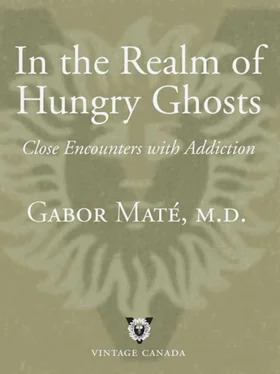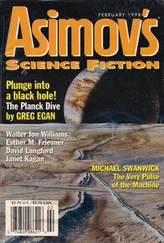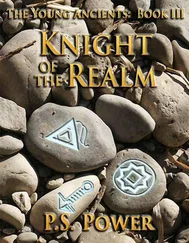Now thirty-five, Remy has been an addict since his teenage years. His first drug of choice was cocaine. The heroin habit he acquired in prison is managed successfully with methadone, but he’s rarely been off cocaine since his discharge. After I diagnosed his ADHD, he agreed to stay away from it—at least temporarily, so we could give him a trial of methylphenidate, better known by the trade name Ritalin.
He was astonished the first day he took this medication. “I’m calm,” he reported. “My mind isn’t going off like a machine gun. I’m thinking instead of just spinning. It’s not fucking going sixty different miles an hour, in twenty different directions. I’m going, ‘Hang on, I’ve gotta do one thing at a time here. Just let’s slow down here.”
A few days later, free from the agitating effects of cocaine and with his brain’s hyperactivity soothed by methylphenidate, Remy returns to my office in a reflective frame of mind. “There’s something I need to talk to you about.”
I wait. Remy says nothing for a long time. Then: “I out and out fucking stabbed a guy once. I was up for four days, cocaine. I started drinking booze; I was a fucking mess. I was just the worst thing—I was a nightmare waiting to happen.
“I was in jail almost ten years. Ten years. All because of drugs. Every day I think about it. Every day, man. Every day…I won’t tell it to other people. I’ll just slough it off like it doesn’t mean something. But it does mean something…I took some guy’s life who did not deserve to die. ’Cause I was all fucked up on cocaine, and pills, and fucking booze…”
Nothing in medical training prepares you to hear an admission like this. Remy was in my office seeking absolution as surely as if he were a penitent in a confession booth and I, a cassock-garbed priest.
“We all have moments in our lives that we wish we could relive…and do over again,” I say. “But for you, this must be a big one.”
“You know, I remember one thing my mom said to me. What it would take to straighten me out, she said, is if I ever began to listen to my heart. And I’m beginning to. That thing that I did, that terrible thing, is the only thing I have. That’s reality, my reality. And I’m accepting it now.”
“Can you forgive yourself?”
“Yeah, I can. I don’t know how, but I can forgive myself. His family will never forgive me, though. They want to kill me. But myself, yeah, I will not let it bring me down. I’ve got to move on with my life. I mean, it’ll always be there, but I’ve got to move on and stay positive and stay focused on living. I have to! I don’t know if that’s right or wrong, but I can’t dwell in the past and let it bring me down. Otherwise, I’m fucked.”
“Have you ever communicated with the family?”
“No. They’re very, very prejudiced against white people. It was a Native guy I killed, and they’re very, very prejudiced…”
I suppress my urge to point out that a family’s grief and anger or even vengeful feelings in such circumstances do not necessarily imply racial bigotry.
“Forgiveness is an important concept in the Native community.”
“Yeah, not for this one. I know…That’s why I left Saskatchewan. They’re looking for me.”
“Let me suggest something to you.”
“You mean, write a letter to myself, to them? I know exactly what you’re going to say!”
“That is what I was going to say. You see, you’re listening to your heart.”
“It makes sense, doesn’t it,” says Remy, enthused. “I could try that, just to see how it would make me feel. I’ll bring it to you and you read it. We’ll talk about it…. I’ll take my medications. I like to write first thing in the morning. I’ve been thinking about it—as soon as you mentioned it, I knew what you were going to suggest. This might help clear my mind a little more. I think about it every day…I’m not into taking people’s lives. You know, this happened eleven years ago.” I’ve often seen Remy hyper but never so charged with purpose.
Later the same week, Remy is back in my office reading his composition, simultaneously nervous and triumphant. His rabbit eyes dart about, skipping from the paper he grasps in both hands to my face, constantly gauging my reaction. As he speaks, he sways, shifting his weight back and forth from one foot to the other.
To Whom It May Concern:
You do not know me, although the name on the envelope might ring a Bell. I am the individual who took your son’s life…on the 14 th of May, 1994.
The reason I’m writing this letter to you is just to let you know that there is not a day that has gone past since that tragic night took place, when I do not think of what I have done!!
I do not expect forgiveness on the Part of the family. But I feel I must write this to you to let you know how very sorry I am that it happened and that how wrong I was.
This has been eating away at me from 11 years now and I really don’t think that the horrendous disregard and disrespect I have brought upon and done to your Son at such a young age by ending his life at 19 will ever leave my mind.
I’m hoping that the hatred you might have had for me is not as strong as it was in 1994! But if so I understand and can hold no ill feelings towards you or your Family for this.
I am truly and totally sorry for what I have done. I no longer drink alcohol, pop pills like there’s no tomorrow. I don’t do heroin anymore and I have finally given up cocaine, which is at the root of all evil.
Basically I’m writing to say I’m so very sorry for what I’ve done to you and your family and I hope one day you will find Peace.
Remy never did mail the letter. He gave it to me as a keepsake. I wish I could report that he successfully kept the cocaine monkey off his back. He has been unable to do that and, as a consequence, I had to discontinue his methylphenidate prescription. His intentions foundered when, shortly afterwards, he entered into a hopelessly overwrought relationship with a mentally unstable woman even more dependent on cocaine than he was.
There is in Remy an unquenchable optimism and a vital sense of humour. The light of possibility continues to glimmer in him, if only uncertainly. It’s a spark, I’m convinced, that will never be extinguished. His confession and his letter, unsent though it remains, eased his burden. His contrition was deeply felt, his relief palpable. Although not free of cocaine, he says he’s using much less than in the past. I believe him. Perhaps another conversation, another moment of contact with me or with someone else, will help him move forward again. *7

“My mother calls me Canada’s most famous junkie,” says Dean Wilson sardonically. “I probably am.” Dean is a well-known figure at political events and international conferences about drug addiction. One of the founders of VANDU, the Vancouver Area Network of Drug Users, he has been a tenacious and articulate advocate of decriminalization and harm reduction policies, a prime mover in the establishment of the pioneering Supervised Injection Site (also known colloquially as the Safe Injection Site). A Senate committee on addictions hailed his presentation as one of the most inspirational they had heard.
Dean is a thin, edgy figure with brimming-over energy that keeps him physically in motion even when he’s sitting or standing. He speaks rapidly, leaping from one topic to another, interrupting himself only to chuckle at his own witticisms. He’s fifty years old, but like many people with ADD, looks younger than his age. He knows I’ve also been diagnosed with Attention Deficit Disorder and laughs uproariously when I tell him my theory that we ADD folk look young because all the time we spend tuning out doesn’t add to our years. Dean’s fame spread after the international showing of filmmaker Nettie Wild’s award-winning documentary Fix: The Story of an Addicted City. In the opening scene Dean, in business clothing, walks briskly down Hastings and tells how he once received a prize from IBM for selling more personal computers than any other salesperson in Canada. In the next scene, bare from the waist up, he displays his tattoo-covered torso and arms as he injects himself with pure heroin. “Sometime before this video’s over, I will be straight,” he promises the camera.
Читать дальше













